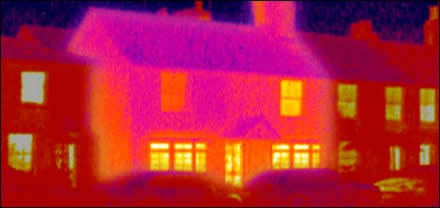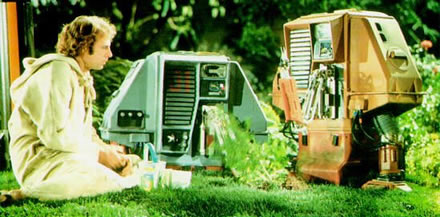
As further evidence of my loosely constructed theory that Hertfordshire is England's own Inland Empire, a liminal interzone with a dark Lynchian underbelly, we learn that drug gangs are moving out of London and into Hertfordshire and the Home Counties, as optimal places to set up cannabis factories in suburban housing estates.
The detached or semi-detached residence on a housing estate, let on a short term contract, provides the archetypal conditions for the high-density farming of cannabis, grown hydroponically under continuously lit sun-lamps. The whole house is turned over to its new function, with even the loft space being used.
As this recent BBC article states, the police are turning to infra-red cameras to detect cannabis grow-houses. We also learn that the industry is dominated by Vietnamese gangs. Electricity is usually tapped off the mains, circumventing the metered supply:
"Other growers, in particular criminal gangs, bypass the problem by wiring directly - and often dangerously - into the electricity mains. Fire is a serious risk - in London in 2006, 50 cannabis farms were discovered as a result of house fires"
It's a lucrative and well run operation:
"Cmdr Allan Gibson, of the Metropolitan Police, estimates half the factories raided in London had been set up and run by Vietnamese gangs. Cmdr Gibson, who also heads up the fight against cannabis cultivation for the Association of Chief Police Officers (Acpo) describes how a typical factory comes about.
A gang member normally approaches a landlord and offers to pay six months rent in advance. He and his cohorts then set to work, blacking out windows and converting as much of the house as possible - sometimes gutting it in the process - into "grow-rooms", complete with lamps and irrigation systems.
From an architectural perspective, it is fascinating to witness not only the versatility of the suburban semi but also the alienation of modern housing estates, that enables these farms to flourish, anonymous, with no intervention or suspicion by neighbours.
The hinterlands of Hertfordshire, with its landscape of new towns and large suburban expanses, has become a prime location for these grow farms.
"In the last four months, Hertfordshire police's Operation Miss has discovered 24 factories resulting in 17 arrests and the seizure of 10,000 plants. Thirteen cannabis houses were discovered in the suburban towns of Hemel Hempstead and Watford, and others were found in Stevenage, Bishop's Stortford and Waltham Cross. Most houses are detached or semi-detached houses in residential streets. Neighbours of one such property in the Hertfordshire village of Standon, six miles west of Bishop's Stortford, had no idea why there were streaks of condensation on the windows of the quietest house in the cul-de-sac. Many concluded the house was occupied by quiet neighbours. "We never saw them that often. They would turn up from time to time, and they only seemed to arrive at night," said one neighbour. But the blinds at number five Orchard Drive were drawn for a reason."

Who would have thought sleepy Standon would have been reminiscent of a scene from Silent Running, with 15 year old Vietnamese boys trafficked in to tend the garden, rather than robot gardeners Huey, Louie and Dewey?
What other secret operations, illicit or otherwise, operate behind closed suburban doors, parasitic functions that devour the host? Are hydoponic cannabis factories the blueprint for farms of the future?
